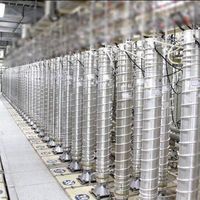Ceasefire in Gaza 'unrelated' to Iran's retaliation plans, says Tehran
Iran's Foreign Ministry said on Monday that the ongoing discussions for a ceasefire in Gaza have no bearing on Tehran's plans to retaliate against Israel for the killing of Ismail Haniyeh in Tehran on July 31.
The ministry's spokesman Nasser Kanaani's comments reflect Iran's position amid escalating tensions in the Middle East, as the country remains determined to avenge the killing of Haniyeh.
"We are not looking for intensification of insecurity in the region. We support efforts with good intentions regarding the ceasefire. Meanwhile, we insist on Iran's legal right in realizing its rights and punishing the aggressor and creating deterrence against a terrorist regime. We will use it at the appropriate time," he said.
The assassination of Haniyeh in the Iranian capital has not been claimed or denied by Israel, a move that only heightens the already tense relations between Tehran and Tel Aviv.
The conflict in Gaza, which began on October 7 of last year with an attack by Hamas militants on Israeli soil killing almost 1,100 people, has dragged on for ten months. Over 40,000 people have been killed in the Gaza Strip according to Palestinian health authorities. Despite ongoing negotiations, the prospects for a lasting peace remain bleak, with both sides entrenched in their demands.
The US, under the leadership of Secretary of State Antony Blinken, has been pushing for a ceasefire, labeling it "probably the best, maybe the last opportunity" to achieve peace in the region. However, Kanaani accused the US and Israel of using the negotiations as a tactic to further their own political goals. "The ball is in the US and the Zionist regime’s court," he asserted.
“The US government must show whether the holding of these negotiations is a political maneuver to achieve its own political goals and buy time for the Zionist regime (Israel) to continue the killing of the Palestinian people or is actually meant to create conditions to establish a ceasefire,” Kanaani went on to say.
Amid the diplomatic maneuvers, Iran's defense policy and its support for Hamas and Hezbollah remains unchanged. Proposed Defense Minister Aziz Nasirzadeh for President Pezeshkian administration reiterated on Monday Iran's support for the "Resistance Front." Nasirzadeh pledged to bolster military exports to Iran's allies, despite international sanctions imposed on Tehran for its involvement in the Ukraine war, where it supplied explosive drones to Russia.
“The Resistance Front is not separate from us; when we talk about the armed forces, the Resistance Front is also included," Nasirzadeh declared, signaling Iran's intention to continue its controversial military activities.
He also underscored Iran's military strength as a key factor in deterring enemy aggression: "Our deterrence and power prevent the enemy's audacity."
As Israel and Hamas remain locked in a deadly conflict, and with Iran's vow of retaliation looming large, the Middle East faces the prospect of further violence and instability.








